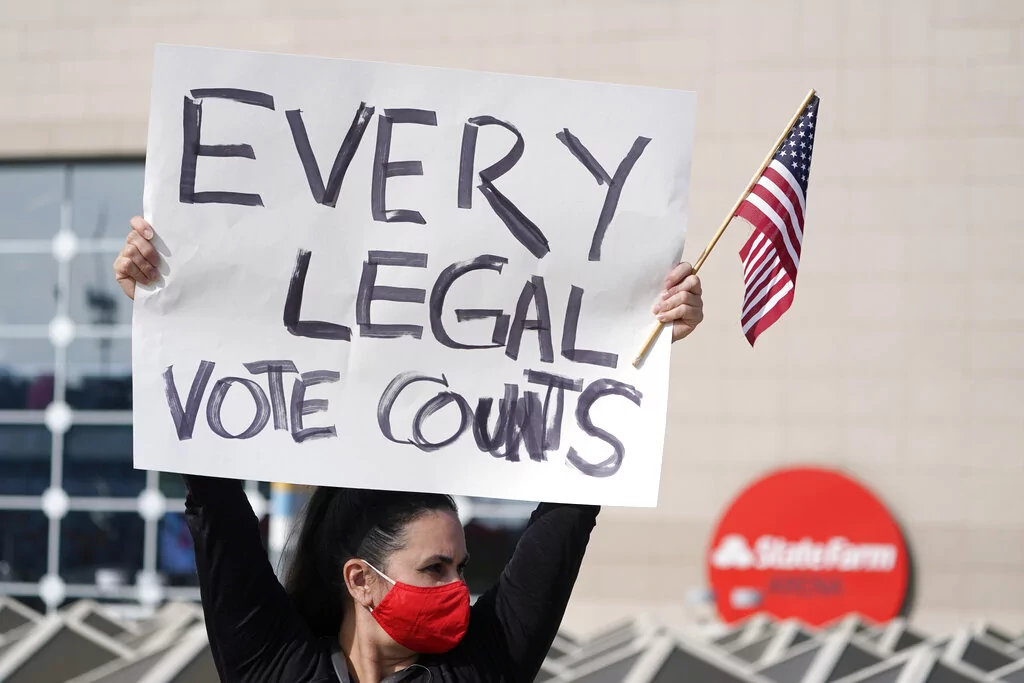
Georgia, with 16 electoral votes, made history in 1968 as the first state to give an independent third-party candidate electoral votes in a presidential election, but became reliably red afterward. Nonetheless, President Joe Biden won the Peach State by 0.2% in 2020, beating Donald Trump.

The Washington Examiner is following the key issues voters care about as they prepare to vote for the next president of the United States. The specific issues being tracked are social security, crime, abortion, economy, and immigration.
The issues were chosen with the help of the Associated Press issues tracker. The Washington Examiner subsequently compared five of the key issues in Google Trends on a state-by-state basis, revealing which issues are most important to voters in swing contests.
Here, you can track how important these various concerns are to the voters in Georgia on a rolling 30-day basis.
Social Security
Georgia ranked social security as their No. 1 issue this election. The spike in concern is likely tied to a massive Social Security data breach in late August that left millions of people vulnerable to leaked Social Security numbers.
In addition, many of Georgia’s rural communities have lost access to Social Security offices, giving the limited caseworkers a heavier and more backlogged workload, thus making the people in need of benefits wait even longer.
Over 1.8 million people in Georgia actively rely on social security, and Rep. David Scott (D-GA) has used social security as a selling point for elections. Scott has sponsored a bill that would amend the Social Security Act, eliminating the waiting period for disability insurance benefits.
Crime
Crime was the second most searched issue in Georgia despite its current crime rates being below the national average. The state is ranked 27th nationally for crime rates, however, its violent crime rate of 3.67 incidents per 1,000 is roughly 12.5% higher than where it was in 2019 prior to the pandemic. Property crime rate is 16.91 per 1,000 residents.
Reports from this summer suggested crime isn’t a huge issue for voters, but concerns have changed after the mass shooting at Apalachee High School on Sept. 4 that killed four people. Now, 70% of Georgians worry about gun violence, and 17% have experienced gun violence themselves. In 2023, there were 25 mass shootings in the state, which is nearly a 14% decrease from 2022.
Economy
Economic concerns ranked third among voter issues. It’s been reported that 2024 will bring an economic slowdown, yet, the state ranks ninth in the nation for economy size, and made up 2.9% of the country’s economy in 2023.
The state also ranks eighth in the country for employment growth with an unemployment rate of 3.4% which is lower than the national average. The third quarter of 2023 saw a gross domestic production of $814.4 billion in goods and services, amounting to 4.5% economic growth.
The mining industry saw 7.9% growth and real estate grew 3.6%. However, educational services fell 0.5% and wholesale trade decreased 3%.
Abortion
In 2019, Georgia was one of the first states to enact a “heartbeat bill,” banning abortions after a heartbeat is detected. After the reversal of Roe v. Wade in 2022, the Georgia Supreme Court ruled in 2023 that abortion is legal in the state, but with extreme restrictions barring the procedure after 6 weeks of pregnancy. After six weeks have passed, the only exceptions are for rape or incest, to save the mother’s life, or if the fetus will not survive the pregnancy.
Although abortion is not on the state’s ballot this Nov., it has still been on voters’ minds — particularly in the May elections for a seat on the state’s Supreme Court. Former state rep. John Barrow (D-GA) ran for the court’s open seat on an abortion-rights platform but fell short, finishing the vote 10 points behind GOP-backed Andrew Pinson.
Since Barrow’s defeat, presidential nominee Kamala Harris has tried to revitalize the issue’s importance in Atlanta, where she spent a significant amount of time talking about women who had died from improper care under the ban.
On Sept. 30, Fulton County Superior Court Judge Robert McBurney rolled back Georgia’s six-week abortion ban, and since then, the state’s attorney general has appealed the ruling to the Georgia Supreme Court and requested the six-week ban be put back in place while the court deliberates.
The Supreme Court sided with the attorney general and reinstated the six-week abortion law just a week after the law was ruled unconstitutional by McBurney. Now, the heartbeat law remains active while further deliberations on the legality of the law take place in Georgia’s Supreme Court.
Immigration
Immigration was the least worrying thing to voters in Georgia, as statistics show the state is widely benefitting from the immigrant-powered workforce. The impacts of immigration are substantial with about 10.8% of the state’s residents being foreign born and 14.3% of the labor force being immigrants.
CLICK HERE TO READ MORE FROM THE WASHINGTON EXAMINER
In 2022 it was reported that there were over a million immigrants in Georgia, with a total spending power of $38.6 billion and $13.6 billion paid in taxes. They account for 20.7% of entrepreneurs, 21.4% of STEM workers and 14.4% of nurses and caretakers.
The top countries of origin for Georgia’s immigrants are Mexico, India, Jamaica, Vietnam, and Korea. Of the immigrants in the Peach State, 49.7% are naturalized, 158,000 are eligible for naturalization, and 29.7% are undocumented. Yet, 89.2% of those undocumented are all a part of the labor force.





